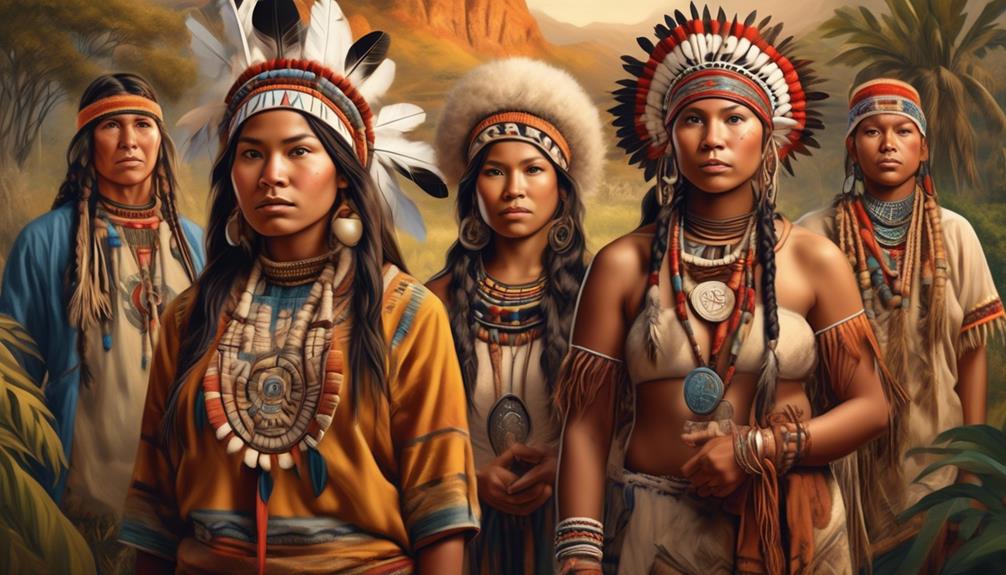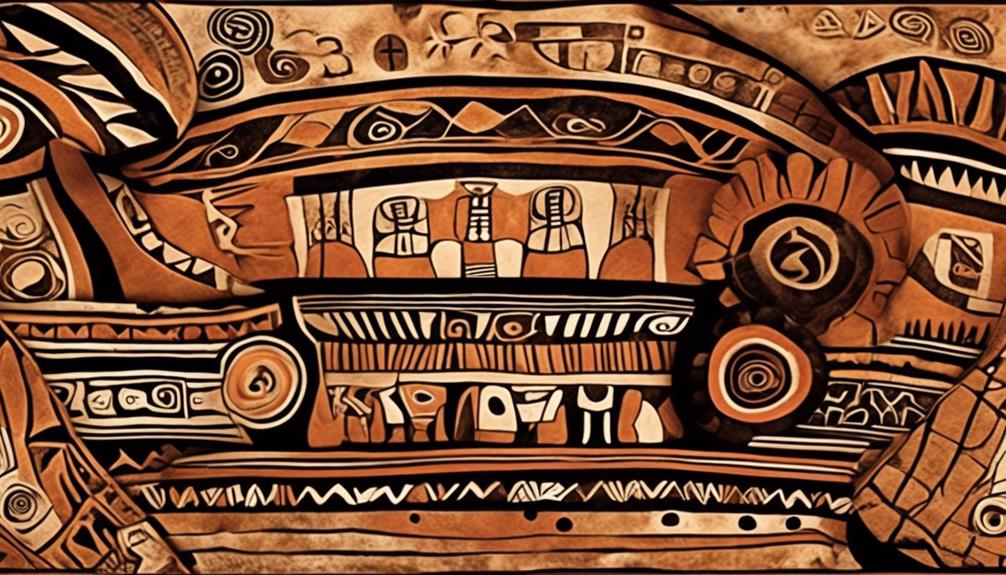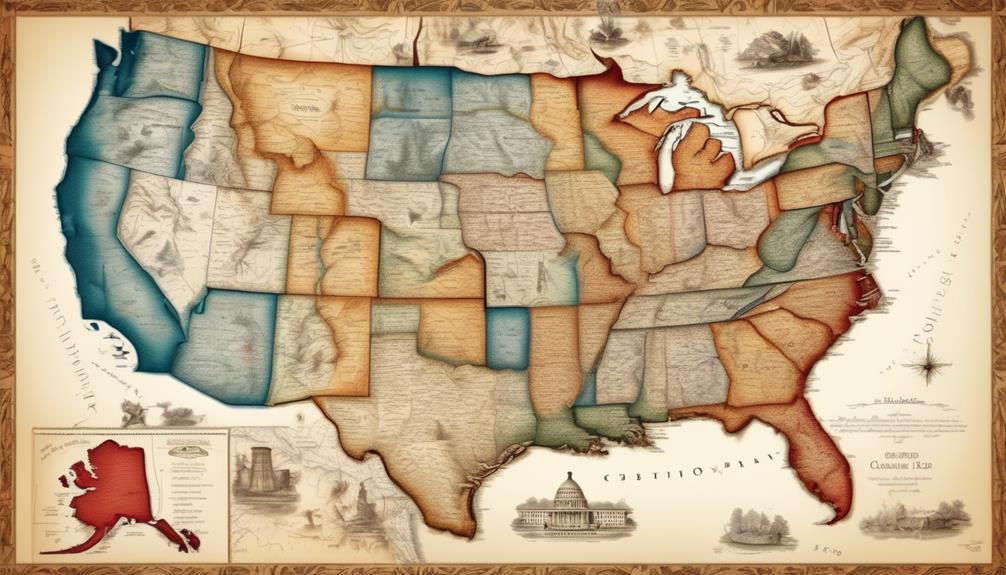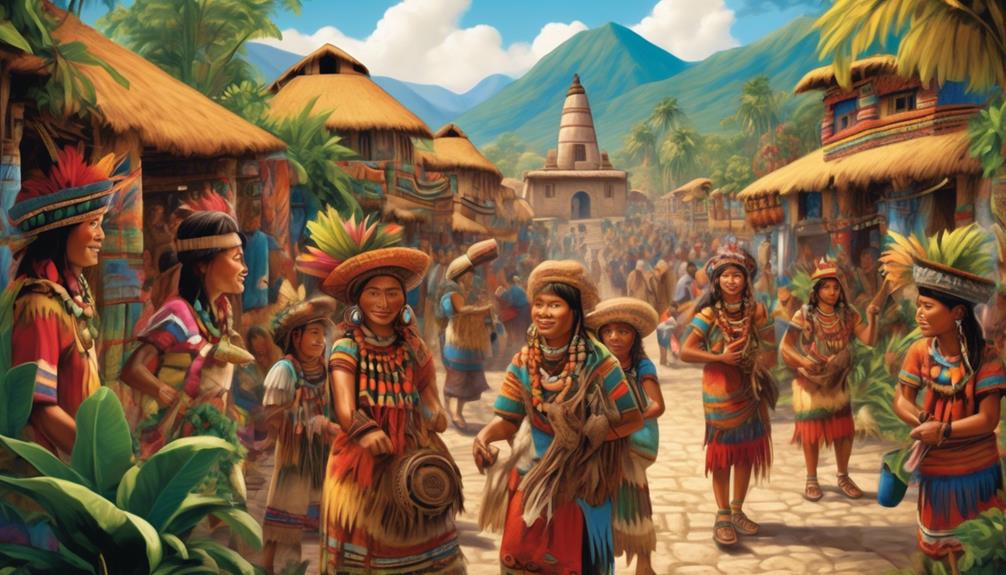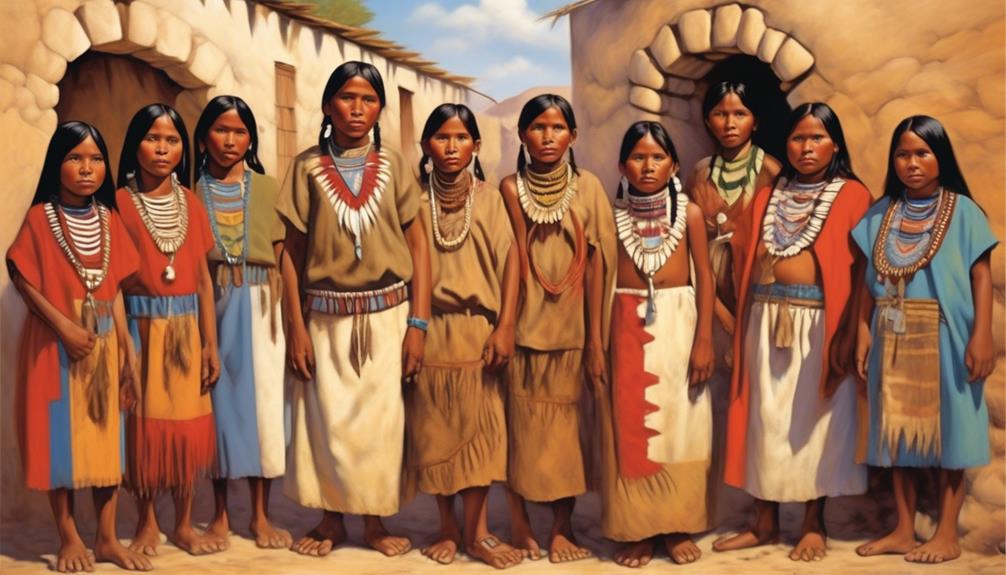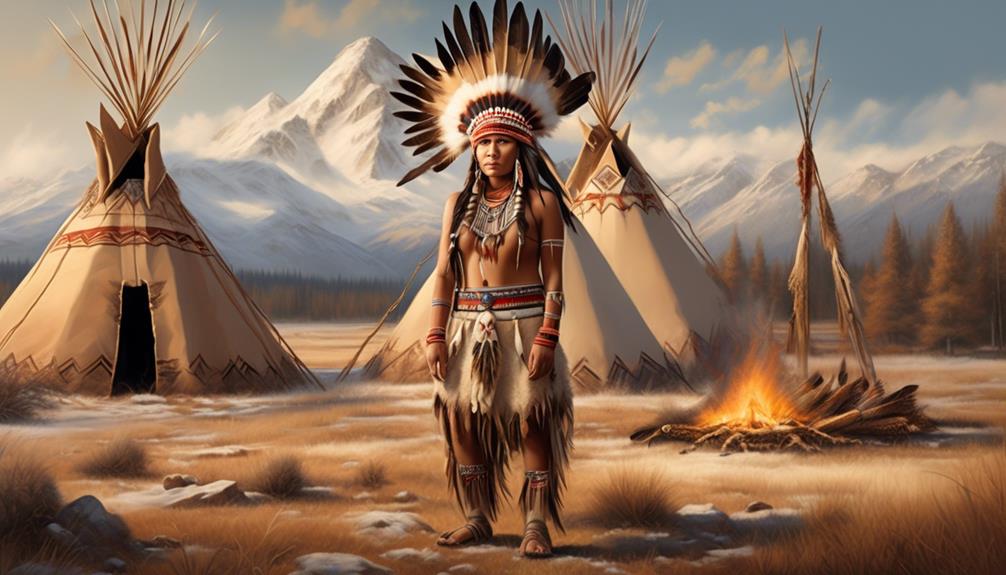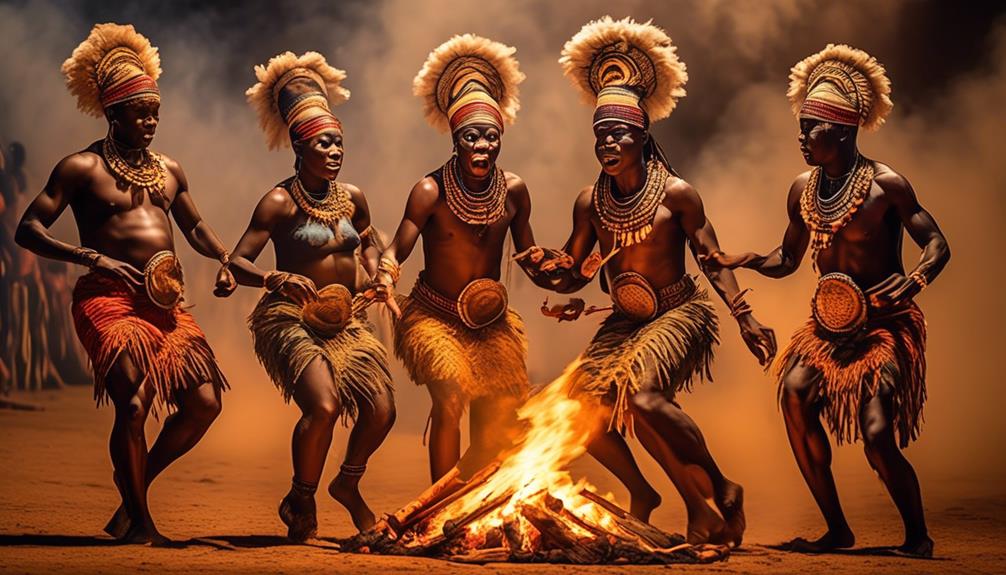Did you know that there are more than 5,000 different indigenous people groups worldwide, each with their own cultural beliefs and traditions that may be influenced by the Bible?
The Bible offers diverse perspectives on indigenous peoples, their identity, land rights, cultural preservation, and their role in God's plan.
As we explore this topic, we'll uncover intriguing insights that shed light on the biblical view of indigenous communities and their relationship with God.
Key Takeaways
- Indigenous peoples are integral to God's plan for humanity.
- Tribal spirituality is intertwined with Christian faith.
- The Bible emphasizes the importance of respecting and understanding indigenous traditions.
- Different cultural practices can manifest God's message.
Biblical Perspectives on Indigenous Peoples
In the Bible, indigenous peoples are depicted as integral to God's plan for humanity, and their unique cultures and traditions are valued and respected. Tribal spirituality is often intertwined with Christian faith, as indigenous communities have incorporated biblical teachings into their traditions. The Bible acknowledges the significance of indigenous traditions, emphasizing the importance of respecting and understanding their ways of life. It promotes inclusivity and acceptance of diverse cultural practices, recognizing that God's message can be manifested through different cultural lenses.
Christian missionaries have historically played a role in introducing indigenous peoples to the Christian faith. While this has led to some cultural changes within indigenous communities, biblical teachings also emphasize the value of preserving and honoring traditional ways of life. The Bible encourages mutual learning and understanding between different cultural groups, promoting unity without uniformity.
As believers, it's crucial to recognize the rich tapestry of indigenous spirituality and traditions, as they offer unique insights into the human experience and the divine. The Bible invites us to embrace the diversity of human expression and to foster a spirit of inclusivity, understanding, and respect for all cultures.
Indigenous Identity in Scripture
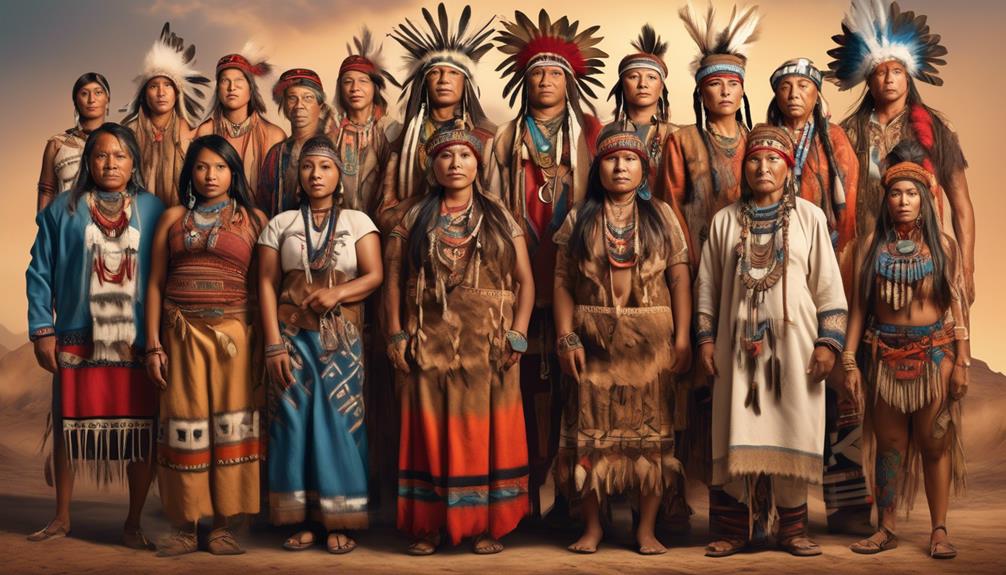
How does the Bible define and affirm the indigenous identity?
From a biblical perspective, the concept of cultural heritage and indigenous identity is deeply rooted in the Scriptures. As we explore this topic, it's important to consider the following:
- Cultural Continuity: The Bible acknowledges the importance of preserving cultural traditions and practices, emphasizing the significance of passing down customs from one generation to another.
- Land Stewardship: Scriptures highlight the connection between indigenous peoples and their ancestral lands, emphasizing the responsibility of stewardship and care for the earth.
- Community and Identity: The Bible underscores the value of community and the collective identity of indigenous peoples, emphasizing the importance of shared history and heritage in shaping communal identity.
Understanding indigenous identity in Scripture involves recognizing the rich tapestry of cultural heritage and the profound significance of ancestral connections. By delving into the biblical perspective on cultural continuity, land stewardship, and community identity, we gain valuable insights into the affirmation of indigenous identity within the context of the Scriptures.
Land Rights and Indigenous Communities
Land rights and the connection to ancestral lands are fundamental aspects of indigenous communities' identity and survival. The Bible acknowledges the significance of land ownership and the spiritual connection indigenous peoples have to their ancestral lands. Sovereignty over their territories and stewardship of the land are deeply intertwined with the cultural and spiritual beliefs of indigenous communities. The Bible underscores the importance of respecting these rights and connections, recognizing the inherent value and significance of the land to the indigenous peoples.
In biblical teachings, the concept of stewardship is central, emphasizing the responsibility to care for and protect the land. This aligns with the indigenous worldview, where the relationship with the land is rooted in a profound spiritual connection and a commitment to preserving the environment for future generations.
The recognition of indigenous land rights and the acknowledgment of their sovereignty over ancestral territories are essential in affirming their cultural identity and ensuring their survival as distinct communities. The Bible encourages a deep respect for the connection between indigenous peoples and their lands, advocating for justice and upholding the rights of these communities.
Cultural Preservation and Biblical Values
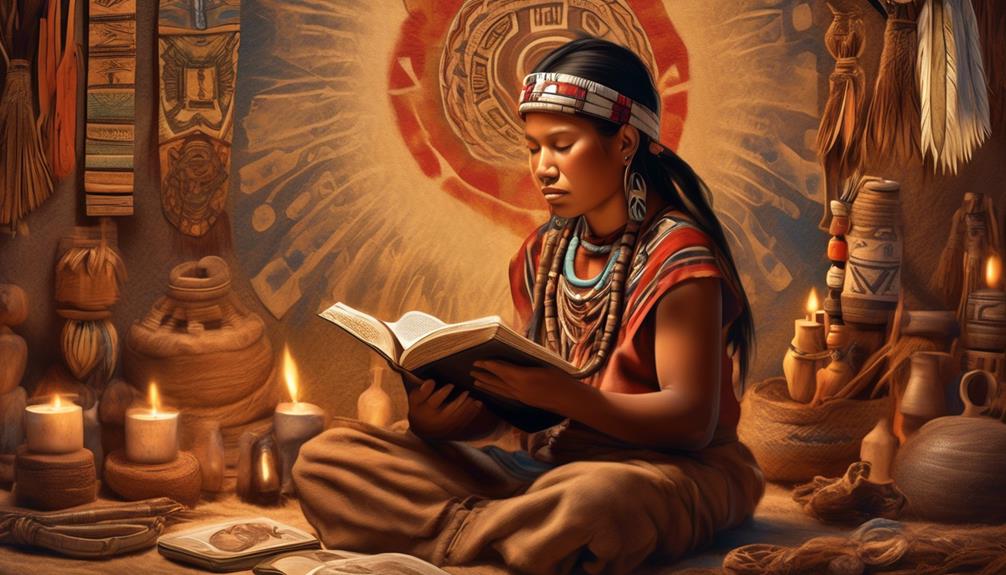
Recognizing the sanctity of indigenous lands in the context of their cultural identity and spiritual beliefs, we find that the biblical values of stewardship and respect for ancestral territories provide a framework for understanding the importance of cultural preservation among indigenous peoples.
- Cultural Heritage: The Bible emphasizes the significance of preserving cultural heritage, as seen in the importance placed on traditions and customs within the Israelite community.
- Spiritual Connection: Just as indigenous peoples have a deep spiritual connection to their lands, the Bible teaches the intertwining of spirituality with the physical land, emphasizing the sacredness of the earth and its connection to humanity.
- Community Identity: Cultural preservation is pivotal in maintaining the unique identity of indigenous communities, and the Bible similarly underscores the value of community and the preservation of its distinct characteristics.
The biblical principles of stewardship, respect, and the preservation of cultural heritage align with the intrinsic values of indigenous communities. By understanding and acknowledging these shared values, we can work towards respecting and upholding the cultural preservation of indigenous peoples while drawing inspiration from the biblical teachings of stewardship and reverence for ancestral territories.
The Role of Indigenous Peoples in God's Plan
In God's plan, indigenous peoples play a significant role in the preservation of sacred traditions and the transmission of cultural wisdom through generations. Their inclusion is a testament to God's divine purpose for all peoples to contribute to the tapestry of human experience.
The Bible affirms the value of diverse cultures and emphasizes the importance of honoring and learning from the wisdom embedded within them. Indigenous peoples, with their unique spiritual insights and connection to the land, offer a perspective that enriches the understanding of God's creation and the interconnectedness of all life.
Their stewardship of the environment and their communal way of life also reflect biblical principles of care for the earth and love for one's neighbor. Through their experiences, indigenous peoples demonstrate resilience, faith, and the enduring power of cultural heritage, all of which are integral to God's plan for humanity.
Embracing indigenous inclusion is thus not only a recognition of the richness of human diversity but also a fulfillment of God's design for unity amidst multiplicity.
Frequently Asked Questions
How Do Indigenous Peoples View the Bible and Its Teachings?
We view the Bible and its teachings through our indigenous perspectives, seeking cultural reconciliation while honoring our traditional beliefs.
The biblical teachings can be interpreted differently based on our unique cultural and spiritual lenses. We value the wisdom and spirituality within our traditional beliefs and strive to find harmony between them and the teachings of the Bible.
This process of integration enriches our understanding of both faith and heritage.
What Are Some Common Misconceptions About Indigenous Cultures and Their Relationship With Christianity?
Misunderstood perspectives and cultural assimilation often lead to misconceptions about indigenous cultures and their relationship with Christianity.
Many assume that indigenous peoples fully embraced Christianity, neglecting the complex history of colonization and forced conversion.
These misconceptions overlook the resilience and unique spiritual traditions of indigenous cultures.
It's crucial to understand the impact of colonialism on indigenous communities and acknowledge their right to practice their own spiritual beliefs without pressure for assimilation.
How Do Indigenous Communities Reconcile Their Traditional Beliefs With Christian Teachings?
In our pursuit of understanding the reconciliation between traditional practices and Christian teachings within indigenous communities, it's crucial to explore the complexities of Indigenous beliefs and Biblical interpretation.
The challenge lies in honoring ancestral traditions while embracing Christian faith. Indigenous communities often navigate this through contextualizing Christian teachings within their cultural framework, finding harmony between the two.
This process requires deep respect for their heritage and a nuanced understanding of Biblical principles.
What Are Some Examples of Indigenous Leaders or Figures in the Bible?
In the Bible, there are examples of indigenous leadership that demonstrate courage and faith. For instance, leaders like Joshua, a descendant of indigenous peoples, showed great strength and wisdom in leading their communities.
These biblical figures serve as examples of indigenous leadership and the importance of embracing one's heritage while following the teachings of faith. Their stories inspire us to honor our cultural roots while living out our faith.
How Do Indigenous Communities Around the World Interpret and Apply Biblical Teachings to Their Own Cultural Practices?
We interpret and apply biblical teachings within our indigenous cultural practices by incorporating our own perspectives.
Indigenous communities around the world approach Christian teachings in ways that honor our traditions and beliefs.
Our interpretation of the Bible is influenced by our unique cultural heritage, shaping how we apply its teachings to our daily lives.
This approach allows us to maintain our indigenous identity while embracing the wisdom found in biblical scriptures.
Conclusion
In conclusion, the Bible teaches us to respect and honor indigenous peoples, their identity, land rights, and cultural preservation.
For example, in the book of Numbers, the daughters of Zelophehad fought for their inheritance rights, showing that God cares about justice for indigenous communities.
Let's continue to learn from and support indigenous peoples as we seek to live out biblical values of love, justice, and compassion.
Mary is a passionate writer who brings creativity and a fresh perspective to our team. Her words have the power to captivate and inspire, making her an essential contributor to our content. Mary’s commitment to storytelling and dedication to promoting Indigenous culture ensures that her work touches the hearts of our readers. We’re fortunate to have her as part of our team.
